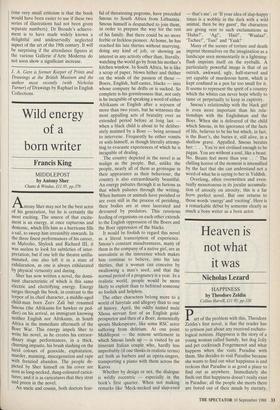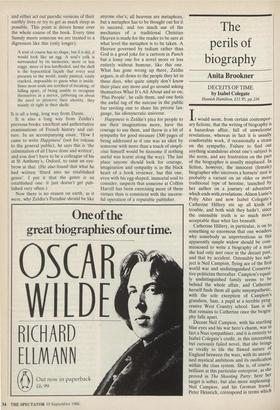Heaven is not what it was
Nicholas Lezard
HAPPINESS by Theodore Zeldin
Collins Harvill, £11.95, pp.320
Part of the problem with this, Theodore Zeldin's first novel, is that the reader has to jettison just about any received eschato- logical notions. Happiness is the story of a young woman called Sumdy, her dog Jolly and pet cockroach Forgetmenot and what happens when she visits Paradise with them. She decides to visit Paradise because she wants to find out what happiness is and reckons that Paradise is as good a place to find out as anywhere. Immediately she finds out that happiness doesn't really exist in Paradise; all the people she meets there are bored out of their minds by eternity, and either act out parodic versions of their earthly lives or try to get as much sleep as possible. This point is driven home over the whole course of the book. Every time Sumdy meets someone we are treated to a digression like this (only longer):
A soul of course has no shape, but if it did, it would look like an egg. A soul's yolk is surrounded by its memories, more or less soggy, more or less hardboiled, and the shell is the hypocritical façade that every soul presents to the world, easily painted, easily cracked, impossible to guess what is inside. Since most souls are terrified of breaking, of falling apart, of being unable to recognise themselves in a mirror, jabbering on about the need to preserve their identity, they mainly sit tight in their shells.
It is all a long, long way from Dante.
It is also a long way from Zeldin's previous books: excellent and authoritative examinations of French history and cul- ture. In an accompanying essay, 'How I came to write Happiness' (not for release to the general public), he says this is 'the culmination of all I have done and written', and you don't have to be a colleague of his at St Anthony's, Oxford, to raise an eye- brow at that. (He also found that what he had written 'fitted into no established genre'. I put it that the genre is an established one: it just doesn't get pub- lished very often.) Now there is no reason on earth, as it were, why Zeldin's Paradise should be like anyone else's; all heavens are metaphors, but a metaphor has to be thought out for it to succeed, and too much use of the mechanics of a traditional Christian Heaven is made for the reader to be sure at what level the metaphor is to be taken. A Heaven governed by tedium rather than God is a good joke for a cartoon in Punch but a lousy one for a novel more or less entirely without humour, like this one. What has gone wrong up there, Zeldin argues, is all down to the people they let in these days, who quite simply don't know their place any more and go around asking themselves What It's All About and so on; `Plus People', he calls them, and one feels the awful tug of the nutcase in the public bar inviting one to share his private lan- guage, his idiosyncratic universe.
Happiness is Zeldin's plea for people to use their imaginations more, have the courage to use them, and throw in a bit of sympathy for good measure (300 pages of being addressed as if one was an idiot by someone with more than a touch of simpli- citas himself would be tiresome if nothing useful was learnt along the way). The last place anyone should look for courage, imagination and sympathy is in the black heart of a book reviewer, but this one, even with his egg-shaped, immortal soul to consider, suspects that someone at Collins Harvill has been exercising more of these virtues than is consistent with the success- ful operation of a reputable publisher.























































 Previous page
Previous page